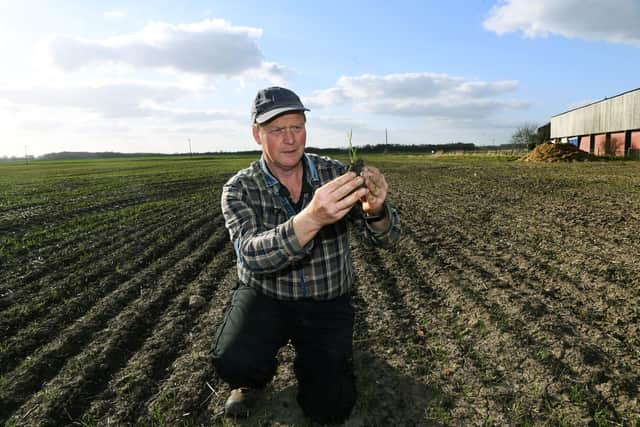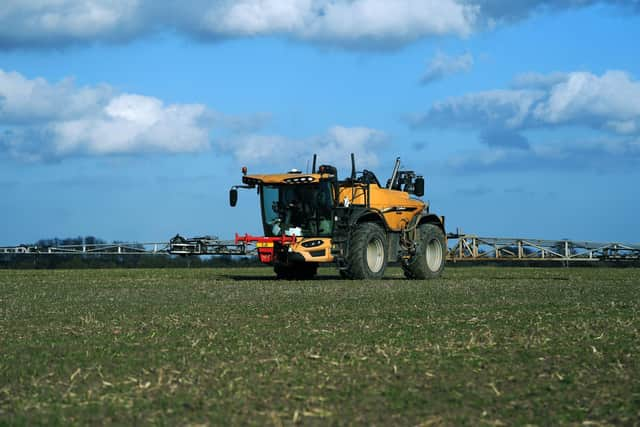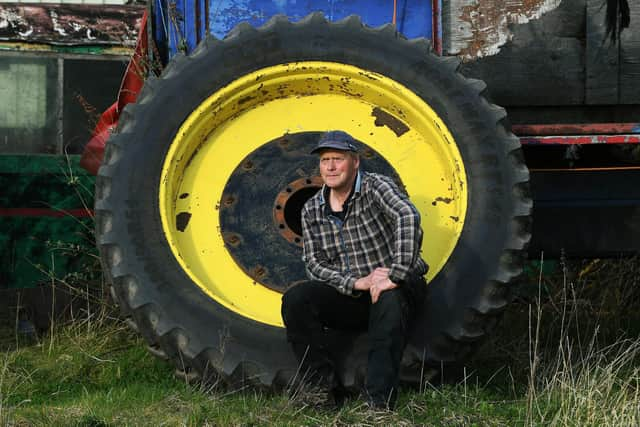Farm of the Week: How the kind loan of a tractor began teenage brothers' arable business
Forty years later brothers Nigel and Adrian Durdy now farm across 1,800 acres of which 500 acres are theirs with the rest on share farming agreements.
Nigel said it had been their love of tractors and getting started on baling straw that has led to where they are today.
Advertisement
Hide AdAdvertisement
Hide Ad“I left school at 16 and Adrian followed two years later when he finished at the same age as I’d been. I hadn’t really given farming a second thought. I just wanted my own tractor, bought one and started baling straw.


“We’ve baled straw ever since. You have to find a route into farming and that was it. I started farming my first bit of land when I was 18, renting a nine-acre field where I grew potatoes. We grew them, graded them and made a bit of money.
“When Adrian joined me, we became N&A Durdy as people know us today. We now have our own land at Shawfield Farm, Haxey, bought in 1998 where we have 272 acres and at Ninevah Farm, Epworth with 228 acres which we took on in 2005. They are just three miles apart.”
Nigel said the shift into share farming that started around the millennium has moved forward the brothers’ farming.
Advertisement
Hide AdAdvertisement
Hide Ad“Share farming became the fashion. Farmers who were getting older and perhaps didn’t have anyone to follow them on the farm; or those who had bought farmland but weren’t farmers began realising the value of a share farming agreement.


“There’s a lot of trust involved on both sides, but it is beneficial to both also. The farmer whose land it is can afford to cash in what farm machinery he had and for us it means we can afford to buy a bit better machinery.
“When you share farm with a farmer you are automatically more invested in that crop than you might have been purely by being an agricultural contractor.”
Nigel talks of their cropping for this year across the overall farmed acreage including owned land and the brothers’ share farming agreements.


Advertisement
Hide AdAdvertisement
Hide Ad“We treat it all as our crops, because share farming is something you are invested in. You share the cost of the inputs and share what you hope will be the profits. We are on a big cereals year.
“This year we have 1,000 acres of winter wheat with half of it down to the Skyfall milling wheat variety. We anticipate that most wheat will go as feed wheat but by growing a milling variety we may achieve milling quality and then we will attract a premium.
“The rest of our wheat is made up of group 4 hard biscuit wheat varieties Gleam and Skyscraper.
“We average between 3 to 3.5 tonnes per acre on what is between Grade 2 and Grade 3 land that is fairly low lying, being only metres above sea level on this well drained area of the Isle of Axholme.”
Advertisement
Hide AdAdvertisement
Hide AdNigel said winter and spring barleys make up the next biggest cropping this time.
“We’re on with drilling spring barley this week. We have 300 acres of the Planet variety to go in. We already have 200 acres of winter barley in the ground, growing hybrid varieties that we established in the autumn. We’d expect an average of 3 to 3.5 tonnes per acre for that, while the spring barley normally comes home around 2 to 2.5 tonnes.”
Oilseed rape is not part of the rotation at present. This will be the second year Nigel hasn’t included it. He said it has been dropped, as many others have dropped it, for good reason.
“Since the bans on chemicals we have had problems with flea beetle and blackgrass and we just weren’t getting the yield. We needed to give the soil a rest. We are growing a bit of rye, around 140 acres, which goes into a local anaerobic digester.”
Advertisement
Hide AdAdvertisement
Hide AdNigel said that although they still deep subsoil there has been no ploughing by he or Adrian for the past 10 years.
“We run a big Simba Solo with legs and discs which means we maintain depth but still work from the top. We establish in one pass. Ploughing is half the speed of some of the other operations. It’s more down to the time it takes rather than cost to us.”
The brothers have built up their farmed acreage the past 40 years based upon hard graft and trust and it has allowed them to invest in the right kind of kit appropriate to their geographic location and in keeping with the development in agricultural machinery technology.
Nigel said that it is all a long way removed from when he first started and how he came by his first tractor.
Advertisement
Hide AdAdvertisement
Hide Ad“Frank Harris was a machinery dealer in Epworth and helped us a lot in our early days. I hadn’t the money to buy my first tractor and Frank just said to take the tractor, earn some money and to pay him when I could. That was how machinery dealers were.
“Massey Ferguson was our brand of choice and while we have had and still have other tractors we have always had Masseys. Because of where we are we have crawlers, a Massey/Fendt combine and a 36 metre Agco RoGator sprayer as well as a team of tractors. They all have sat nav, self-steering and guidance built-in.
“When we are flat out at harvest there are six of us, and we still bale straw as well as share farming. One of our biggest jobs is putting straw on carrots for Guy Poskitt.”
Nigel said he has become known in the area as ‘the sprayer man’ and that he has made the Syngenta Sprayer of the Year Finals each year since taking his spraying certificates in 2005, which was also when he took on the role of agronomist.
Advertisement
Hide AdAdvertisement
Hide AdThe brothers also store grain and Nigel said they have invested well in their systems. “We have pretty good on-floor drying facilities in good buildings, now all I have to do is to learn the art of selling at the right time. Nobody knew the prices that were coming this year.”
Comment Guidelines
National World encourages reader discussion on our stories. User feedback, insights and back-and-forth exchanges add a rich layer of context to reporting. Please review our Community Guidelines before commenting.
